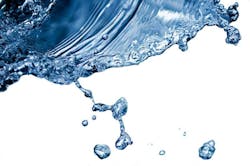National Science Foundation CAREER Award to Help URI Professor Close the Clean Water Gap
Through a prestigious National Science Foundation CAREER Award, Joseph Goodwill, assistant professor of environmental engineering at the University of Rhode Island, is researching a water treatment method that could be especially useful for small, rural communities.
The five-year, $507,240 award will enable Goodwill to work with ferrate and sulfite to develop an advanced oxidation method that can be used to treat water.
According to the press release, Goodwill is looking forward to introducing advanced oxidation to engineering students at URI, which is another major objective of the CAREER Award project.
The students will learn about advanced oxidation by taking advantage of the pilot (water treatment) plant materials purchased by the College of Engineering for approximately $200,000. Funding for the plant was largely provided by the Champlin Foundation and the U.S. Department of the Interior.
Through a partnership with Rhode Island 4H, Goodwill and his students will transport that pilot facility to the Washington County Fair, where they will conduct demonstrations of water treatment to the general public. This might not happen until 2022, when it is safer to do so due to the pandemic.
During the course of the project, Goodwill expects to consult with Dugan Hayes, assistant professor of chemistry at URI. A start-up company in League City, Texas, called Element 26 Technology, will supply the ferrate that Goodwill will use in his research.
